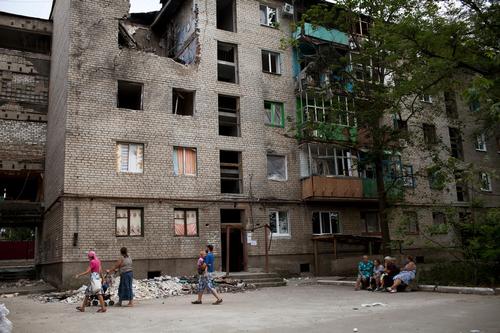Hospitals are shelled, ambulances are taken by armed groups, civilians are injured, and as the conflict spreads, there are few safe places to hide. MSF emergency coordinator Colette Gadenne, just back from the Donetsk region, describes the escalating humanitarian situation in eastern Ukraine.
In the Donetsk region where I was based, the fighting is spread over large areas and the violence is high intensity – there is ground fighting, as well as very heavy artillery fire, hitting not only military targets but also apartment buildings and hospitals.
Donetsk’s Hospital No 1 has been hit by shelling – and it’s not the only one. Many hospitals in the region have been struck. For civilians in the war zone, few places are safe to hide. You never know where the heavy artillery is going to strike and many people have been wounded. An ambulance driver in Luhansk was killed not far from the hospital grounds. In Amvrosievka, some medical staff were killed in the shelling whilst returning from hospital duty.
Large numbers of people have been displaced from their homes by the fighting. Most choose to shelter with relatives, if they have them. There are displaced people everywhere – in the big cities, in the towns, even in small villages.
But the most vulnerable people have nowhere to go. There are a lot of people in this region waiting for their pension to be paid or to receive their social benefits, but in many places the banks have stopped functioning and people have run out of money. Some cannot leave the combat zones and stayed on despite the ground fighting and the shelling. Some of the displaced have nothing – not even food. That’s why they end up seeking shelter in hospitals, where at least they are fed.
I visited a lot of hospitals which struggle with growing numbers of war wounded and displaced.
MSF is providing them with assistance, distributing hygiene kits in the hospitals, as well as supplying drugs and consumables, so that the hospitals can treat the displaced people free of charge.
The humanitarian situation in eastern Ukraine is deteriorating sharply but it’s hidden. The war-wounded and the displaced are spread among the region’s hospitals, and because they are not very visible – because you don’t see a refugee camp, or a long column of people carrying their belongings – they are getting little attention.
Many parts of the war zone are extremely difficult to reach and very dangerous to move around in, because of the intensity of the fighting. MSF’s teams have been distributing medical and surgical kits for treating war-wounded to more than 40 hospitals, enough for 6,200 injured. We have also organised ‘drop zones’ near to the fighting, so that when there is a lull in the violence, hospital staff can come and collect the kits. At the same time we are supplying specialised drugs for dialysis patients, patients with severe burns, and the most severe cases treated in the regional hospital of Donetsk.
For hospital staff in eastern Ukraine, it’s increasingly difficult to run the show. Their commitment to continue to work under such difficult circumstances is amazing. The region is running out of anti-tetanus vaccines and external fixators – a disaster for the war-wounded. The medical staff didn’t expect to be treating all these war-wounded civilians with dreadful injuries, including children and pregnant women.
The people of eastern Ukraine didn’t expect this war; they never imagined such things happening in their own country. And it is far from over - we have now to prepare for the coming winter and all the additional hardship and challenges it will bring.



